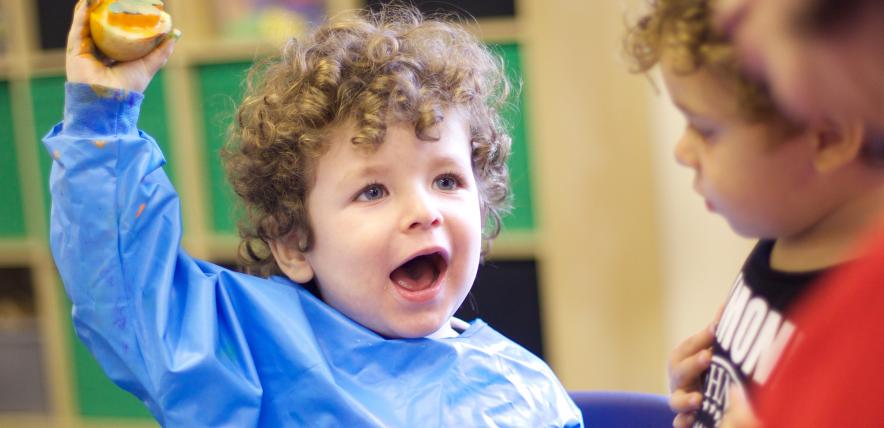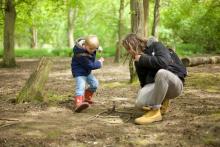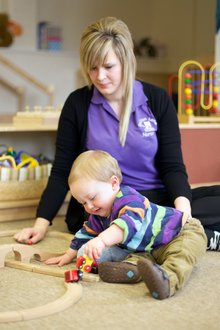In Part 1 of this blog, we looked at the first five top tips for turning your child on to learning. We continue here with the next five.
 1. Let them play (Open Ended)
1. Let them play (Open Ended)
Give your child open-ended playthings. Open ended means an object, or material that can be transformed. A material that when left alone, does nothing in particular, but comes to life in the hands of a child. How many of us have played with a cardboard box as children – what did it become? A house, a ship, a car …? My favourite things to use are shells, stones, logs, scarves, wooden blocks, paper, cardboard tubes … Natural materials stimulate the senses, things like scarves and bits of material stimulate the imagination. Imaginary play is a really important learning and development skill – it helps language skills, decision making, problem solving, and self-esteem, as well as many other skills.
2. Let them play (Sensory Rich)
Provide a sensory-rich environment. Have materials around the home that will stimulate the senses: finger paints, percussion instruments, and puppets. Sand or mud are great for sensory exploration, foodstuff such as smelly fruit – lemons and oranges, flour, cornflour, oil and water can be used to mix, touch, smell, taste. See your home as a learning environment and EMBRACE THE MESS!
3. Let them play (Equality)
It’s never too early for you to promote equality with your child and to tackle stereotyping and discrimination. By doing this, you can help raise children who can fully participate in the world as they grow. I had a boy in my last nursery who would go to the dressing-up rail as soon as mum and dad had said goodbye. He would put on the same pink princess dress and would spend the whole day in this dress. He loved it. The other children accepted this, only commenting on it if they wanted a turn wearing the dress themselves. Several times his Dad would come to pick him up and would always show his displeasure that Harry was in the dress – usually by commenting “You’re a boy. Boy’s don’t wear dresses, you look stupid. Take it off.” After a while we knew whether it would be Mum or Dad picking Harry up, because on the day Dad picked him up, Harry wouldn’t wear the dress. What a shame – I found it really sad… Children learn from the world around them and gender stereotypes tend to highlight inequality and differences between men and women, rather than seeing everyone as being people first and being equal. If they want to wear the princess dress celebrate that!
4. Step Away From The Child
So many of us are ‘helicopter parents’ We’re ‘hovering’ nearby and if we see our children struggling with something, or doing something that’s even a little bit risky, we tend to jump in and help, or stop them. “Can’t do that puzzle piece? I’ll do it for you.” Again, children need to go through the process themselves – it’s how they learn. If we are constantly jumping in and stopping that process, we risk:
- Turning them off the activity
- Making them feel they are failing
- Making them unwilling to take risk
- Stopping the whole learning process
I know that it’s sometimes challenging – sending your child out into a hostile world, knowing they might fail, struggle or be laughed at. But being in the world isn’t always an easy process for any of us and children must struggle sometimes – to learn to be resilient, to learn and develop, to learn and understand.
5. Value their Learning
Think about different ways to celebrate your child’s achievements, stickers or reward charts can be useful in some situations but there are more meaningful ways such as:
- Verbally praise your child for being on task “I love the way you really concentrated on that painting”
- Ask about their learning “What did you like about that activity?” “What do you think you learned?”
- Listen to your child’s ideas and respond to them “What a great idea! How can I help you with that?”
- Set aside an area of the house for displaying their creations and awards
Learning is a life skill. I’m 52 years old and am learning all the time. I love to learn – I get great satisfaction from it. Learning helps me evolve as a person, adapt to change, meet challenges, find out what I need to know … If I have passed that love of learning onto any child – mine or others that I have taught over the years, well that is a life well spent!
Re-read part one of this blog here.
View the infographic as a pdf here
Written by Jo Fitzgerald, early years teacher and founder of Tiny Sponges
Visit Tiny Sponges on Facebook
Or join the Facebook group here







